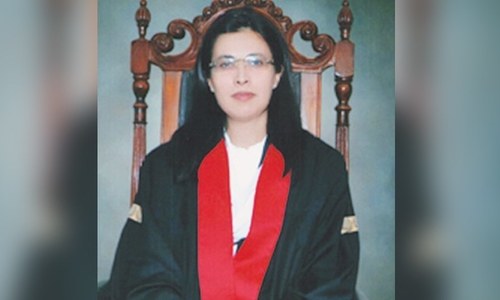
• Invites lawyers to discuss matters instead of agitating
• AGP calls for taking up pleas of the late Justice Seth, SHC bar for hearing to settle appointment criteria
ISLAMABAD: While reacting to the lawyers’ Sept 9 convention which accused the judiciary of favouritism in the appointment of superior court judges, Chief Justice of Pakistan (CJP) Gulzar Ahmed on Monday regretted that the agitation by the legal fraternity was “totally uncalled for”.
“There had been 41 judges in the judicial history of Pakistan who were elevated to the Supreme Court bypassing the senior most judges of the respective high courts, but none of such appointments were ever objected to earlier by the lawyers,” observed the CJP, also wondering about the actual purpose of their agitation last week.
The chief justice was speaking at a ceremony held at the Supreme Court building to mark the advent of the new judicial year. Interestingly, neither vice chairman of the Pakistan Bar Council (PBC) Khushdil Khan nor President of the Supreme Court Bar Association (SCBA) Abdul Latif Afridi was present in the courtroom No. 1 where the ceremony was organised though they were represented by PBC’s Amjad Shah and SCBA’s Ahmed Shahzad Farooq Rana.
The legal fraternity had staged a protest demonstration outside the Supreme Court and later held a convention in the nearby Supreme Court Bar Association (SCBA) complex, accusing the judiciary of favouritism and pick and choose in the appointment of superior court judges and thus harming the image of the judiciary.
“Still my doors are open and representatives of the lawyers can come any time to discuss matters of significance,” the CJP said, reminding the lawyers that they had raised objections despite knowing that there had been a practice and mannerism on the procedure of appointment of judges. The Judicial Commission of Pakistan provides the CJP the authority to nominate judges for elevation and then through a proper consultative manner appointments were made, he explained.
“The lawyers should have come to us instead of launching a sort of one-sided agitation without any discussion with the CJP on the issue,” he observed. This time, he noted, no one came to him for discussion and when he asked for PBC vice chairman and SCBA president he was told that they were in Peshawar.
‘Challenging year’
The CJP observed the previous judicial year, just like the one before that, was not the average judicial year by any means. This year has been one of the most challenging in history, not only for the Pakistani judicial system but also throughout the world due to coronavirus pandemic.
It contributed directly to other challenges such as delay in disposal of cases posing a severe, unseen and intricate challenge to the court’s ability to perform its functions, especially the expeditious disposal of cases, he said. “Despite this, we have kept the doors of our courts open for the public, enforced strict SoPs and vociferously enabled the right of the people to get justice from our doors,” the CJP said.
Case against dictator
Earlier, Mr Shah of the PBC said it was appreciable that courts decided and decreed cases against the former prime ministers promptly, but it was a matter of concern at the same time that the case against the dictator who flouted the Constitution twice had never been fixed for hearing.
He also asked for bringing more transparency in the appointment procedure of judges and reminded the consistent demand of lawyers that judges should not accept jobs after retirement since it was against their exalted stature.
Freedom of expression
He also emphasised upon the emotive issue of missing persons and highlighted “how speaking the truth has become the biggest crime” and that the media was under intense pressure on part of the government.
Also, Attorney General for Pakistan (AGP) Khalid Jawed Khan highlighted the need for bridging the rising gulf between the bench and the bar. He said the relations had deteriorated in the past also, but had never reached the level during a democratic dispensation as it was at present. “We lawyers are wordsmiths and through power of persuasion and force of our arguments, we used to pull victory out of jaws of defeat,” he said.
“Sadly today even those amongst us who once inspired others by their eloquence and sobriety seem to have run of words,” the AG regretted, adding the lawyers “no longer seemed capable of engaging in any informed debate”. He said once words were their weapons but at present they were seen observing strikes and locking or blocking the doors of courts.
Need for dialogue
The attorney general said there had never been a greater need for a meaningful dialogue and interaction between the bar and the bench as it was at present.
Referring to the seniority principle, the AGP said while seniority carried its own legitimacy the fact remained that it was more of a coincidence of birth or placement than an achievement relatable to performance or other human traits that distinguish people. Hence, there was the need for other meritorious considerations such as performance in high courts, independence, commitment to democracy and fundamental rights, temperament, capacity, diligence, ability and willingness to deliver and so on, the AGP claimed.
The perception, whether actual or imaginary, that there was court packing or pick and choose in the appointment process, resulting in bypassing of senior judges of the high courts was so pervasive and destructive of this august institution that even if it was completely imaginary, it had to be firmly dispelled to everyone’s satisfaction, he added.
Call for hearing Justice Seth’s plea
The AGP also proposed that criteria for the appointment procedure be settled through judicial order of the court by hearing pending petitions of late Chief Justice of Peshawar High Court Waqar Ahmed Seth and Sindh High Court Bar Association.
The SCBA secretary, however, highlighted the need of removing the perception of a division in the top judiciary.
Published in Dawn, September 14th, 2021














































